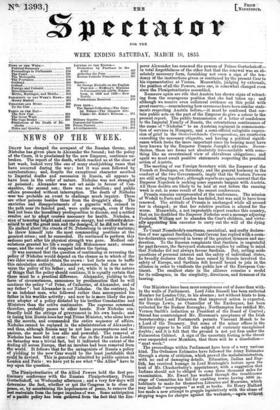The Plenipotentiaries of the Allied Powers held the first pre-
liminary conference with th6 Russian Plenipotentiary, Prince Gortschakoff, on Wednesday afternoon • and a very few days will determine the fact, whether or not the Congress is to close in ppeeaeccee, or, by ascertaining the hopelessness of peace, to remove the feat restraints from the larger impulses of war. Some anticipation of a pacific Tolley has been gathered from the fact th4t the Eat- peror Alexander has renewed the powers of Prince Gortsehakoff-- in total forgetfulness of the other fact that the renewal was an ab- solutely necessary form, furnishing not even a sign of the ten- dency of the instructions given or continued by the present Czar to his representative at Vienna. Meanwhile, judging by externals, the position of all the Powers, save one, is somewhat changed even since the Plenipotentiaries assembled.
Rumours again are rife that Austria has shown signs of retract- ing from the courageous position that she had taken up ; and although we receive even collateral evidence on this point with great reserve,—remembering how erroneous have been similar state- ments respecting Austria before,—it must be confessed that cer- tain public acts on the part of the Emperor do give a colour to the present report. The public transmission of a letter of condolence to the Imperial Family of Russia, the ostentatious continuance of the name of "Nicholas" to an Austrian regiment in commemora- tion of services in Hungary, and a semi-official eulogistic expres- sion of grief in the Oesterreichische Correspondenz, are courtesies exceeding the necessary etiquette, and having a political signili- canoe which looks the more important since its bearing must have been known by the Emperor Francis Joseph's advisers. Never- theless, these are forms not absolutely irreconcilable with some- thing like an overstrained view of chivalrous obligations; and again we must await positive statements respecting the practical action of Austria.
The meeting of our Foreign Secretary with the Emperor of the French at Boulogne, on Saturday, and the general harmony in the conduct of the two Governments, imply that the Western Powers are still acting together ; although reports are again current that the Emperor Napoleon is seeking some separate bargain with Austria. All these doubts are likely to be laid at rest before the ensuing week is out, in some result of the recent conferences.
Prussia remains unrepresented at the conferences. The mission of Wedell to Paris and London has failed, but was said to have been renewed. The attitude of Prussia is unchanged while all around her is changed ; so that her relative position is altered for the worse. Meanwhile, a not improbable report reaches this country, that on his deathbed the Emperor Nicholas sent a message adjuring Frederick William not to abandon the Czar's children, and virtu- ally appointing him executor to carry out the will of the dying des t o Count Nesaelrode's courteous, casuistical, and crafty declara- tion of war against Sardinia, Count Cavour has replied with a coun- ter-declaration conceived in terms of the greatest firmness and mo- deration. To the Russian complaints that Sardinia is ungrateful for past favours, the Savoyard statesman replies by calling to mind that Nicholas did not always favour Sardinia. But, settingoside questions of personal interest and the safety of individual states, he broadly declares that the issue raised by Russia involved the safety of Europe, and Sardinia felt herself bound to join in the alliance in order to vindicate the public law of the European Con- tinent. The smallest state in the alliance remains a model for its colleagues, in the simplicity, directness, and firmness of its bearing.


























